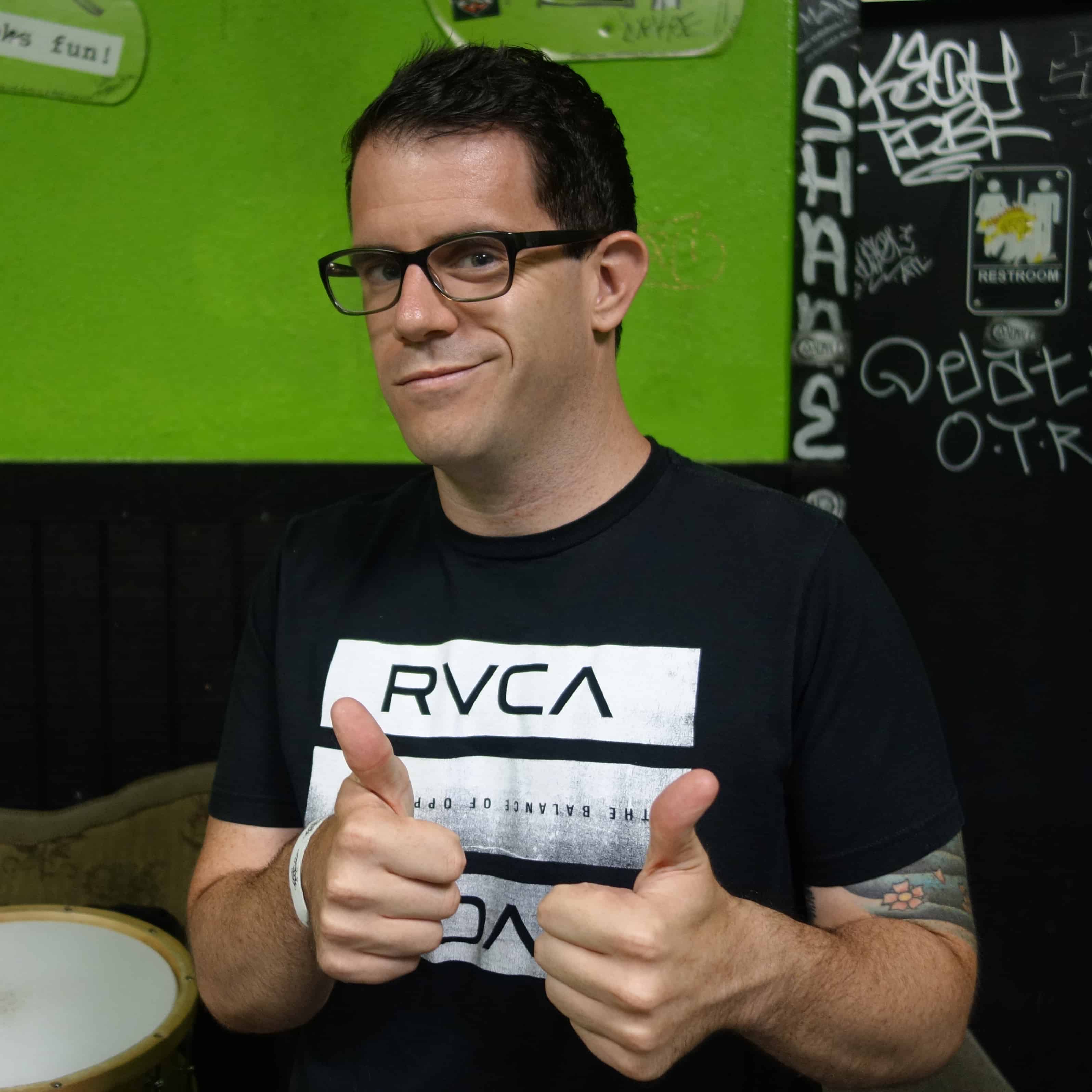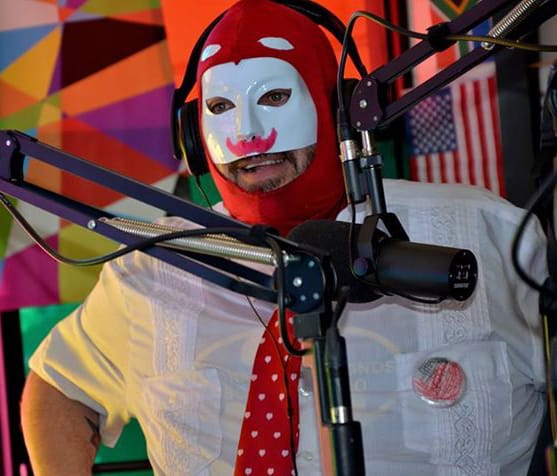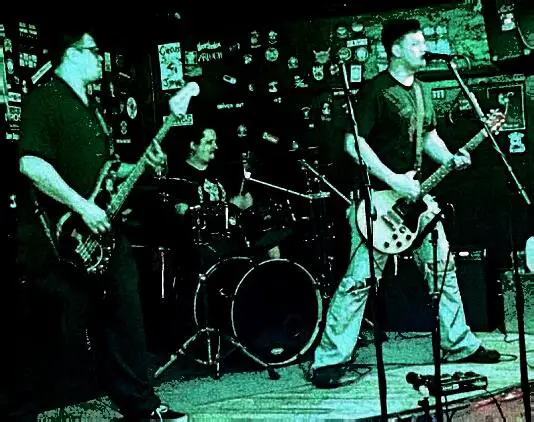Scars of Tomorrow: Bob Bradley Interview
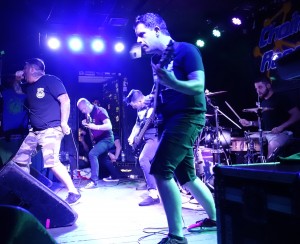 Throughout the years Scars of Tomorrow have accompanied metal and hardcore bands like Eighteen Visions, Atreyu, and Bury Your Dead on dozens of national tours. On August 2nd By the Barricade caught up with Scars of Tomorrow guitarist Bob Bradley at Chain Reaction in Anaheim, California at Bleeding Through’s final west coast tour with Winds of Plague, and Lionheart. This writer learned more about the band’s 7th studio album Failed Transmissions, how they spend their time off tour, and how the scene has changed over their 14 year history. You can take a nostalgia filled trip down memory lane with the interview transcripts that follow.
Throughout the years Scars of Tomorrow have accompanied metal and hardcore bands like Eighteen Visions, Atreyu, and Bury Your Dead on dozens of national tours. On August 2nd By the Barricade caught up with Scars of Tomorrow guitarist Bob Bradley at Chain Reaction in Anaheim, California at Bleeding Through’s final west coast tour with Winds of Plague, and Lionheart. This writer learned more about the band’s 7th studio album Failed Transmissions, how they spend their time off tour, and how the scene has changed over their 14 year history. You can take a nostalgia filled trip down memory lane with the interview transcripts that follow.
Bob Bradley – Guitar
By the Barricade: After more than six years Scars of Tomorrow released their 7th album Failed Transmissions. What have you been doing for those six years out of studio?
Bob Bradley: For the last six years most of us have been focusing on our careers and other projects. Most of our current lineup works in the music industry and our vocalist Mike Milford runs Artery Recordings based out of Sacramento. They’ve been putting out some great records from bands like Atilla and Chelsea Grin. Our bass player Michael Nordeen who has been in other bands like The Human Abstract does management for Artery as well. I have been running a couple small companies in Orange County, California. One’s called Airtime PR, and the other is a licensing firm for television called Gas Can Music who works with a lot of cool bands in different genres. Our other guitar player Therron Francis works for Apple full time, and our drummer Sam Shepard also works with Artery. We’ve all been busy with our families, working full time, and playing in other bands. We are a little all over the place living our life and still have to pay the bills, but we are very thankful that we can still work in a creative industry.
By the Barricade: What was the catalyst to start recording again?
 Bob Bradley: It’s been ten years since Rope Tied to the Trigger was released on Victory Records so it was a little nostalgia fueled by missing each other as friends. It’s fun to just play music; when you spend a lot of your time helping other musicians you can’t get that out of your system. All of us will always be doing something on the side even if it’s just a little bit because it’s in our blood. Now we’re excited to be recording music and playing shows again.
Bob Bradley: It’s been ten years since Rope Tied to the Trigger was released on Victory Records so it was a little nostalgia fueled by missing each other as friends. It’s fun to just play music; when you spend a lot of your time helping other musicians you can’t get that out of your system. All of us will always be doing something on the side even if it’s just a little bit because it’s in our blood. Now we’re excited to be recording music and playing shows again.
By the Barricade: A lot has changed within the scene since Scars of Tomorrow’s formation in 2000. What do you think has changed the most, and what’s stayed true?
Bob Bradley: Well as you get older your viewpoint on what the scene is changes. It’s become a lot more commercial especially with metal. There’s now plenty of large bands like Slipknot, Avenged, The Devil Wears Prada and Lamb of God. Bleeding Through and Winds of Plague have had a taste of that and many chances to play really big festivals. Back in the early 2000s bands like Avenged Sevenfold, and Atreyu were getting that same taste of massive success by being some of the first to break out of the local scene. At that time people were into radio rock, so bands like Killswitch Engage and the others I’ve mentioned rose to the top and made room for these bands to grow. The modern metal/hardcore scene is a little different and has evolved. There’s still that sense of community that hardcore bands are known for, but they have unfortunately lost many of the ‘do it yourself’ smaller venues. It’s just gotten more commercial and a whole lot bigger overall though.
By the Barricade: I’ve heard a lot of bands say creating and producing an album in 2000 was a much bigger and more difficult milestone in their career back in the early 2000s. Now it’s almost a cheaper necessary normality for small scale bands. What’s an equivalent milestone in 2014?
Bob Bradley: It’s a lot easier for bands to write songs compared to when we started in 2000. It was a lot more expensive, and you had to pay top dollar to track your albums/demos, but it’s still all about the songs no matter what. You have to have that synergy, and fluid energy to write a great song. A good milestone is playing in front of fans and getting people to acknowledge your music. I don’t think it’s any easier to do than it used to be. It’s easier to write songs, but you still need to do that leg work though social media and playing shows to build up your fan base. There’s more bands than ever so if anything I think it’s harder to break through. It’s easier to find those bands you hear of, but to break past local band status can be very difficult.
By the Barricade: So you still think Social Media is still a legitimate way to get your music to fans despite corporate changes?
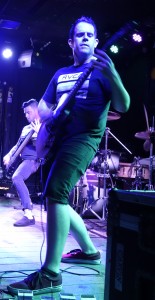 Bob Bradley: It’s one of the only ways besides going to shows and giving out CDs, but a lot of people don’t have CD players anymore. You still have to be present, go to shows, make fans, make friends, hand out flyers, and do social media promotion with ad campaigns with a good website. You should build good quality relationships along the way and also focus on solid online presence.
Bob Bradley: It’s one of the only ways besides going to shows and giving out CDs, but a lot of people don’t have CD players anymore. You still have to be present, go to shows, make fans, make friends, hand out flyers, and do social media promotion with ad campaigns with a good website. You should build good quality relationships along the way and also focus on solid online presence.
By the Barricade: How has your past touring and work experience changed the way you play and record?
Bob Bradley: With the Current lineup, for Scars of Tomorrow the expectation is different now. We started it because we loved music, but we also want to make a living doing this without a day job. Right now it’s all about getting to the venue, playing shows, having fun, and hanging out. Back then you wanted to make it a job whether people want to say it or not. If you don’t make money as a musician you have to get a job. It’s more about having fun and hanging out at this point.
By the Barricade: There are thousands and thousands of working class bands. When do you think is the step where you make the leap to a career instead of a hobby?
Bob Bradley: It depends on the band’s circumstances. If you have a hit single and your pulling tons of people to your shows, maybe it’s time to start putting in your time off requests or looking into getting a booking agent. Using social media is a really effective way to find out where you are popular outside your home town. Without that it will be tough to get that record deal to really hit the next level. You still need a manager, a good label, and distribution to get there. A few bands out there can do it all by themselves, and I totally support that, but until you secure a manager, publicist, and find that record deal you’re looking for it’s tough to reach that next level so don’t quit your day job until you know you can make enough money as a band to each pay your bills. It does involve a huge risk. You may not make as much as you do at your day job, but as long as you can avoid being completely homeless, or have a support system back at home it’s time to jump. A lot of bands make a record and quickly think they can do it full time or are obligated to get that deal, but you have to put in that leg work and figure out where your fan base is, and when’s best to tour.
By the Barricade: Anything else you want to say to the readers of By the Barricade?
Bob Bradley: We are really thankful that the guys in Bleeding Through, Wind of Plague, and Lionheart took us out on the road. They are all amazing people so support their music and I know you’ll like what you hear.
Keep it on Bythebarricade.com for more hardcore, punk and rock interviews, reviews, articles, and photos! Also, “Like” By the Barricade on Facebook to never miss a post. If you liked this article check out:
Review of Food Chain by The Bunny The Bear

